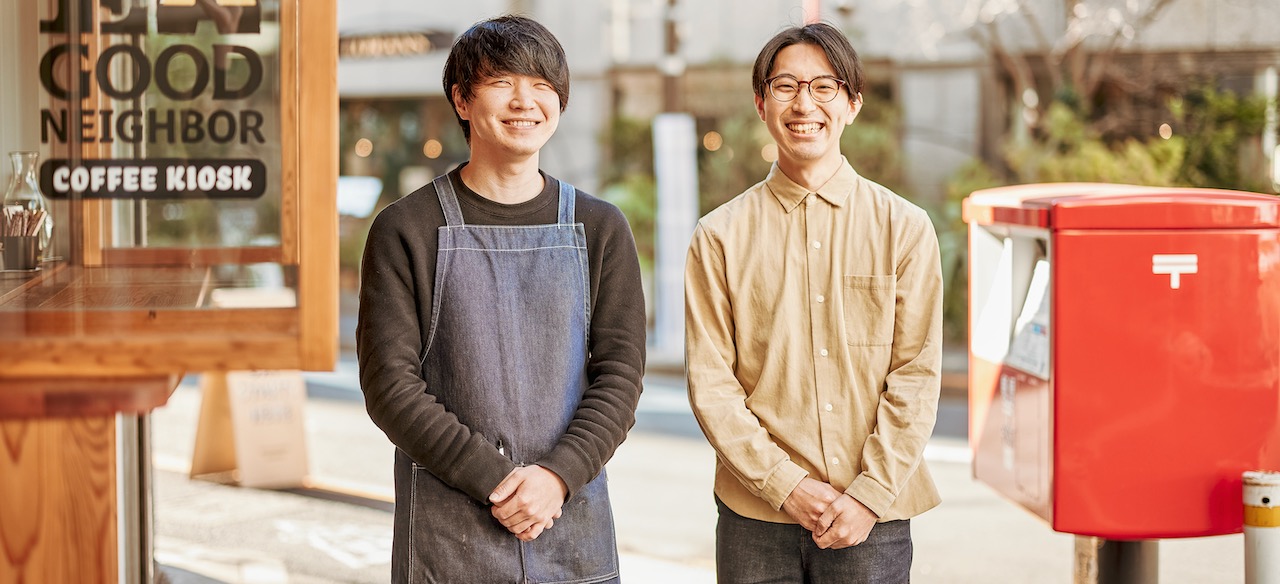
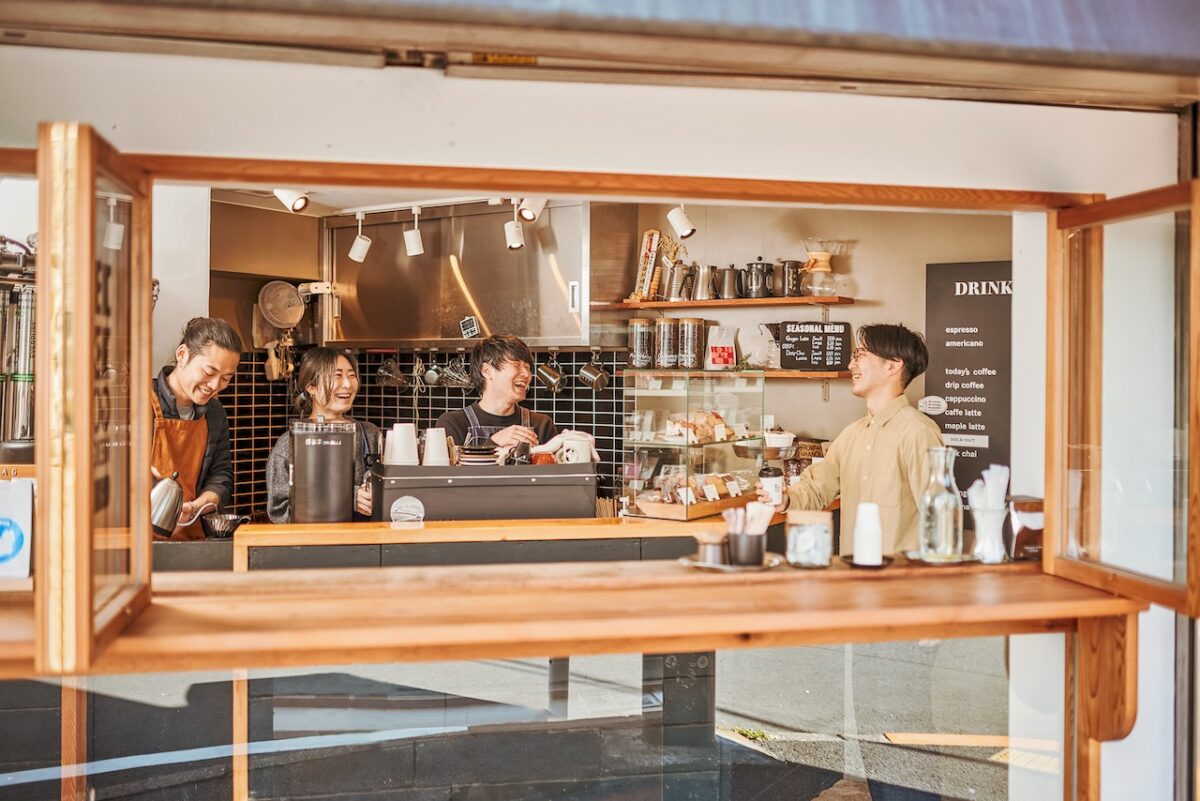
Sendagaya, Tokyo, is both an office district and residential area, home to a cluster of clothing companies, schools and houses. Also in this neighborhood are Meiji Jingu shrine and Japan National Stadium. It is here where coffee stand BE A GOOD NEIGHBOR COFFEE KIOSK and roastery and confectionery GOOD NEIGHBORS’ PROVISIONS are located.
BE A GOOD NEIGHBOR COFFEE KIOSK draws a steady stream of local residents and office workers from nearby, in some way living up to its name. The men responsible for this shop as well as roasting and quality control at its second branch in Oshiage are 31-year-old Ryusuke Suzuki and 28-year-old Masaya Ikeda. Though young, they are already in positions of great responsibility. We’ve spoken to Suzuki and Ikeda to find out how they can always be themselves and how they create an open atmosphere for people around them.
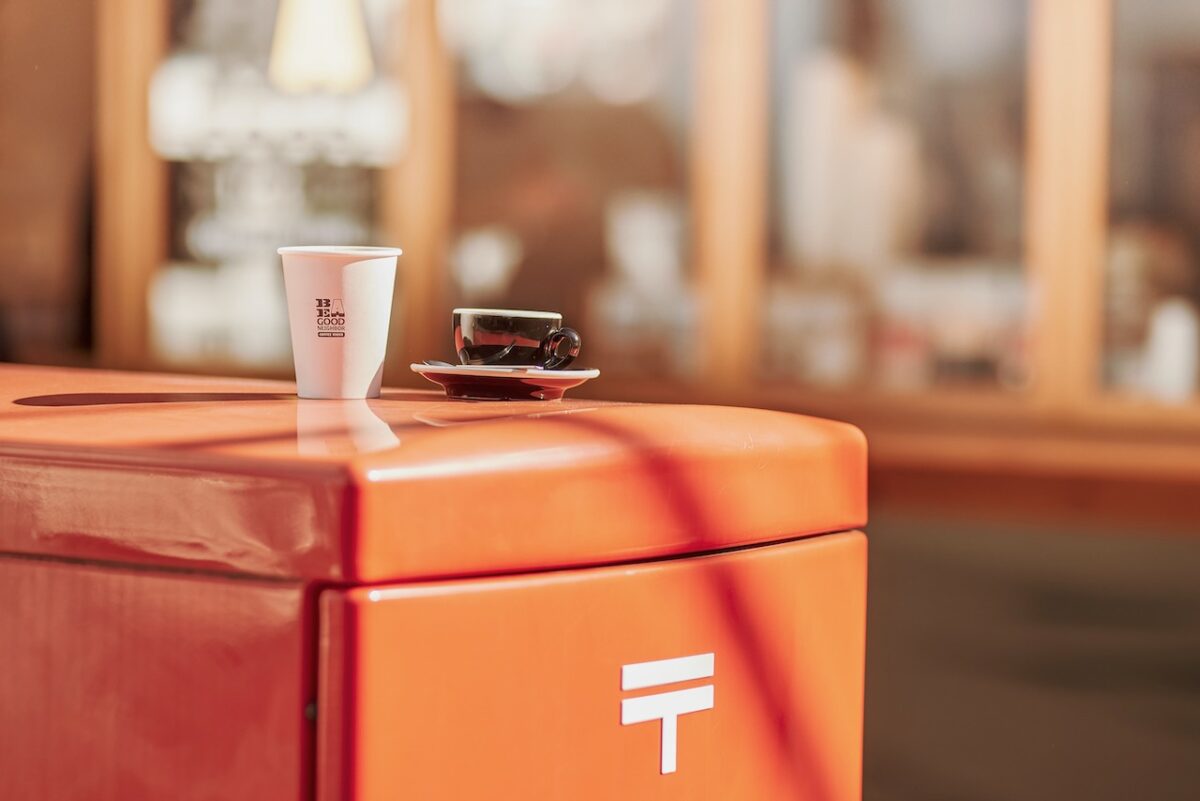
A spring of connections with good neighbors
At the entrance of one cafe in San Francisco, there is a coffee cup on a newspaper vending machine.
A photo capturing such a scene of everyday life is the origin of BE A GOOD NEIGHBOR COFFEE KIOSK, which opened 11 years ago. That snapshot was taken by editor Hitoshi Okamoto, one of the co-founders behind KIOSK. Suzuki explains.
“When Okamoto was in the United States, he saw firefighters clad in gear drop by that San Francisco cafe to buy coffee. Something about the scene resonated with Okamoto and inspired him to make such a place in Japan, too. There is a mailbox in front of our shop in Sendagaya. And customers place coffee on it and chat with their friends, or postmen stop by for a coffee break during delivery. Sometimes their colleagues also visit us after hearing about our shop from their peers. Moments like those make me feel that Okamoto’s vision actually came true.”
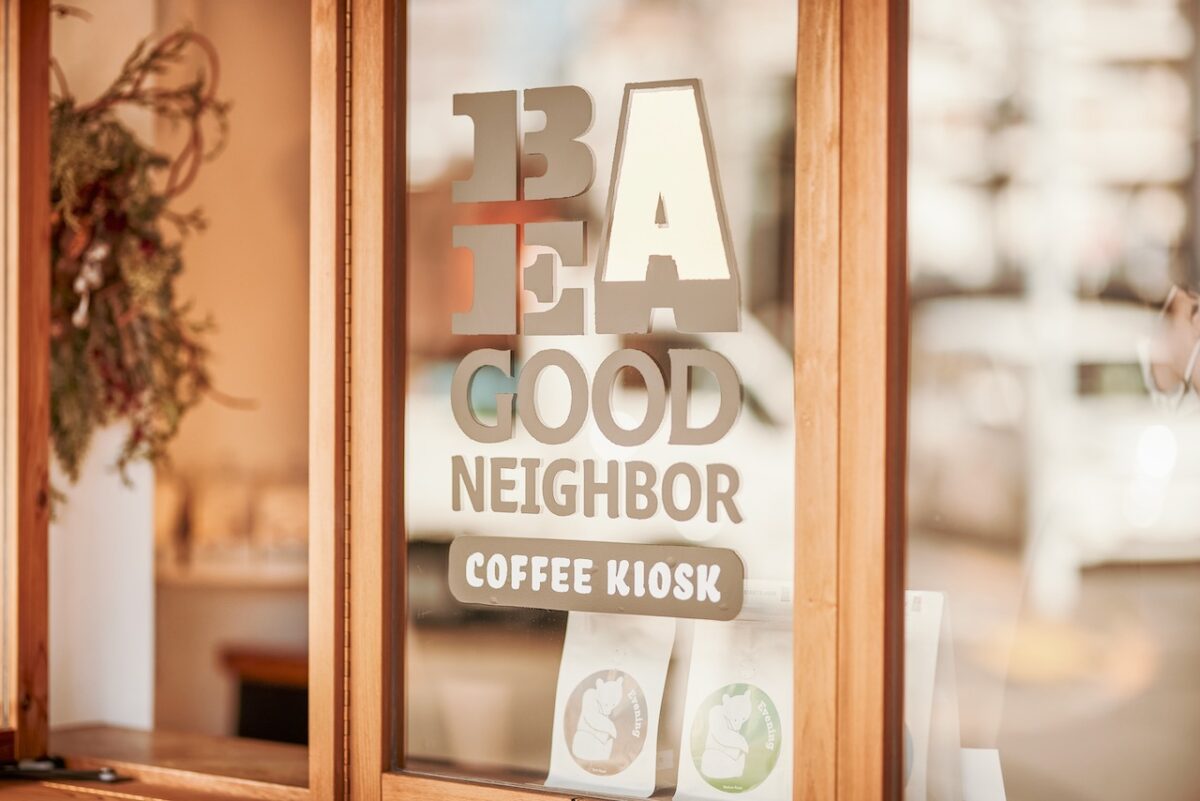
The store’s name “BE A GOOD NEIGHBOR” embodies a wish to make the cafe part of people’s everyday lives.
“During an overseas business trip, Okamoto saw the slogan “BE A GOOD NEIGHBOR” plastered across an apartment building. Just four words, instead of ‘Let’s make an effort to do this’ or ‘Please refrain from doing that.’ These four words were intended to nudge people to be considerate to others and maintain warm relationships with them. The slogan left a strong impression and struck a chord with Okamoto.”
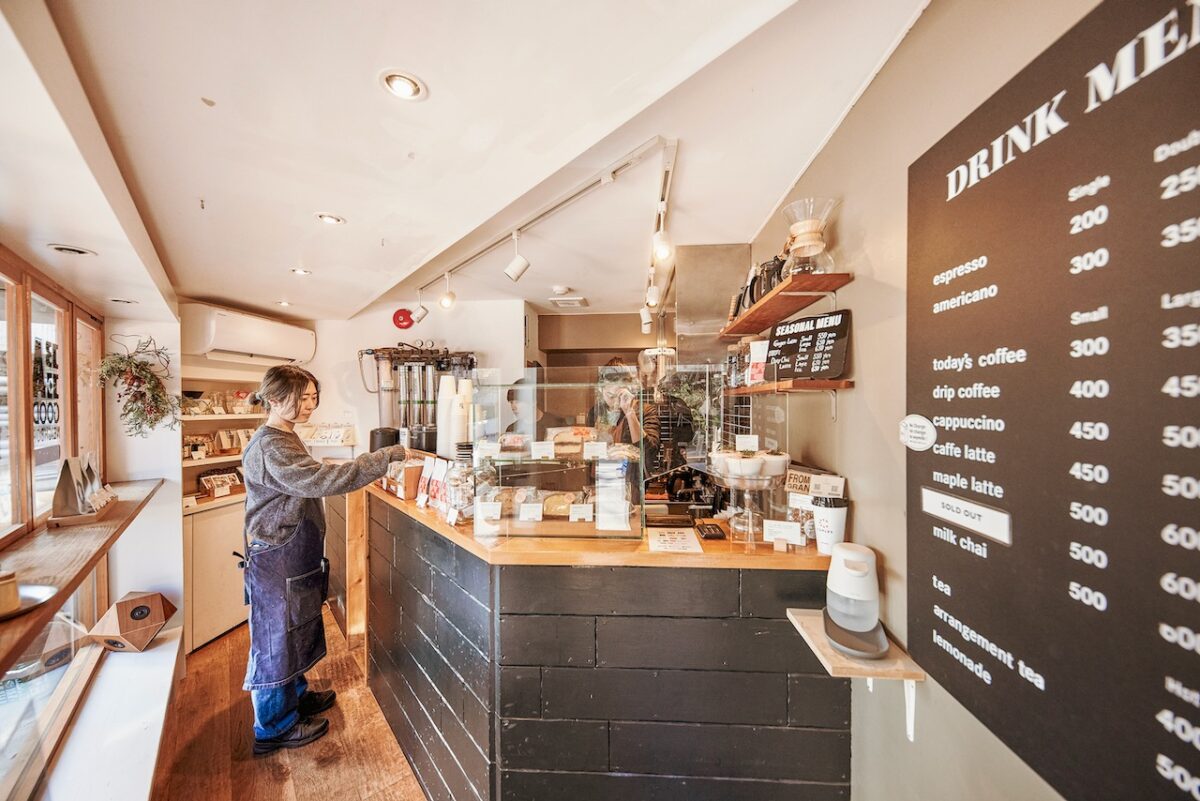
Suzuki’s employer owns multiple properties. When one of the places ended its operations as a small tobacco vendor and became available, the company decided to open BE A GOOD NEIGHBOR in its place. But back then, specialty coffee had yet to catch on in Japan.
“I heard the company named it KIOSK because the space was so small that to call it a coffee house or cafe would be an embarrassment.”
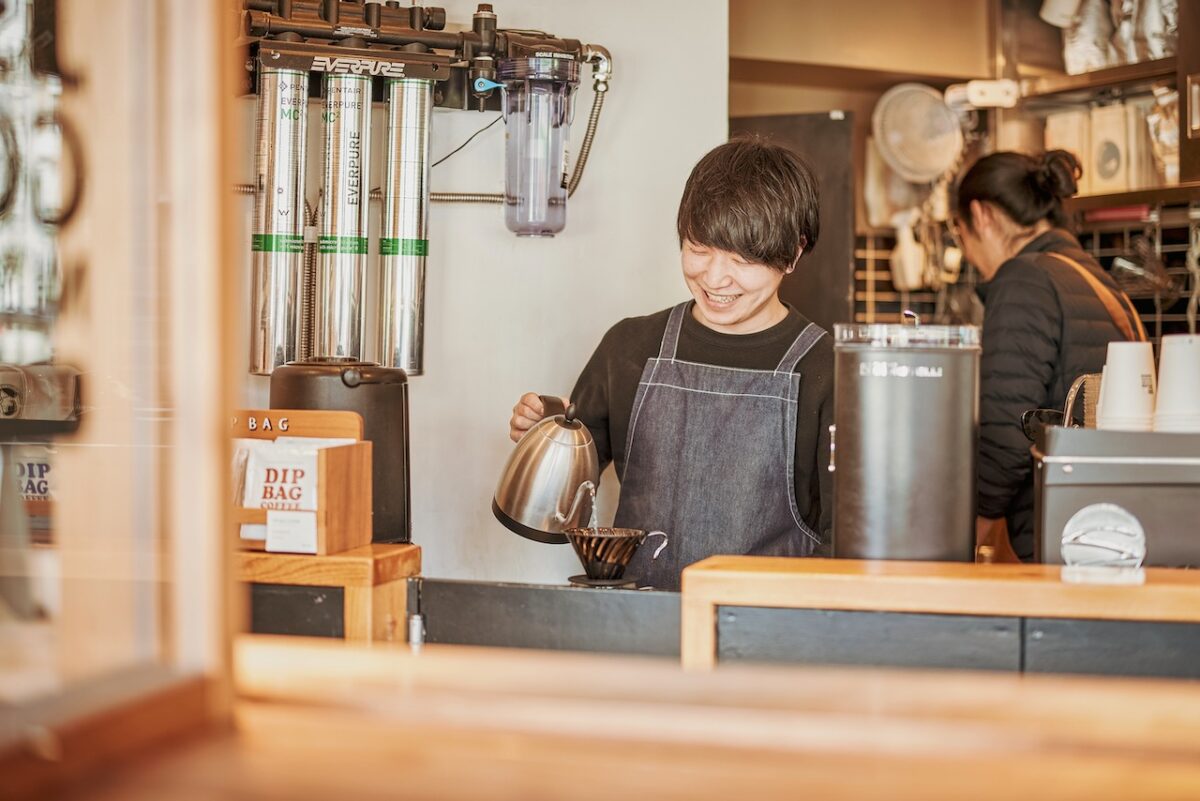
Though the store has the approachable feel of a kiosk, a place where people make a quick stop to get just what they need, KIOSK is a bit more than that: It is also a wellspring of relationships and communication.
“KIOSK is surrounded by many businesses,” says Ikeda, store manager. “Office workers from nearby drop by during a break or lunchtime on weekdays. For many of them, a visit to KIOSK is a daily routine. And some people come and buy coffee two or three times a day. Casual conversations with customers sometimes lead to a collaborative project with their companies. For instance, we worked with a clothing brand and a handbag brand to make our original T-shirts and bags. I think we have built a good relationship with neighbors, both as a coffee shop and a company.”

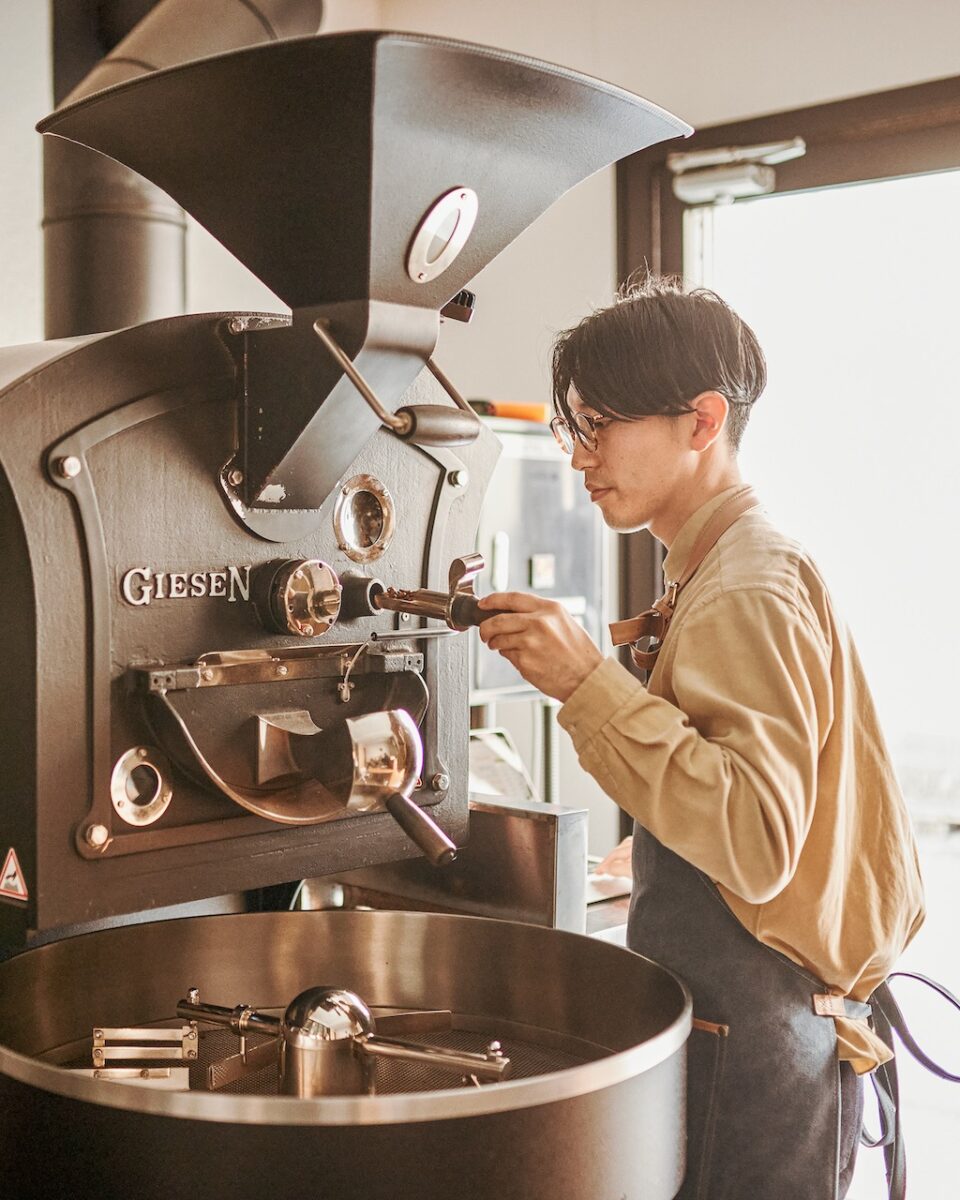
Unexperienced, but taking over roasting one month in
The approachable and open feel is something PROVISIONS has in common, Suzuki says, referring to the roastery.
“We don’t get general customers at PROVISIONS. But people working in the coffee industry and our personal acquaintances swing by. Since we share a roaster with them, we can openly discuss roasting at PROVISIONS. Exchanging opinions with them breaks down my rigid preconceptions and broadens my horizons.”
Suzuki entered the company two years ago. He had years of experience as a barista, but was new to roasting.
His career as a roaster traces its roots to a tour of Costa Rican farms he joined when working at Starbucks, his previous job.
“Coffee production inevitably has a negative impact on the natural environment. Costa Rican producers said that’s why they need to understand their environmental impact, appreciate the environment and do what they can to minimize the damage by taking such measures as using organic fertilizer as much as possible. Seeing their honest approach prompted me to think about what I can do to help.
I also learned ways to keep green coffee fresh as well as production techniques. I wouldn’t have known about those painstaking efforts had I just kept at my work in a cafe. I became interested in green coffee after that experience, and grew anxious to become a roaster, because it’s the role that’s the closest to the raw materials.”
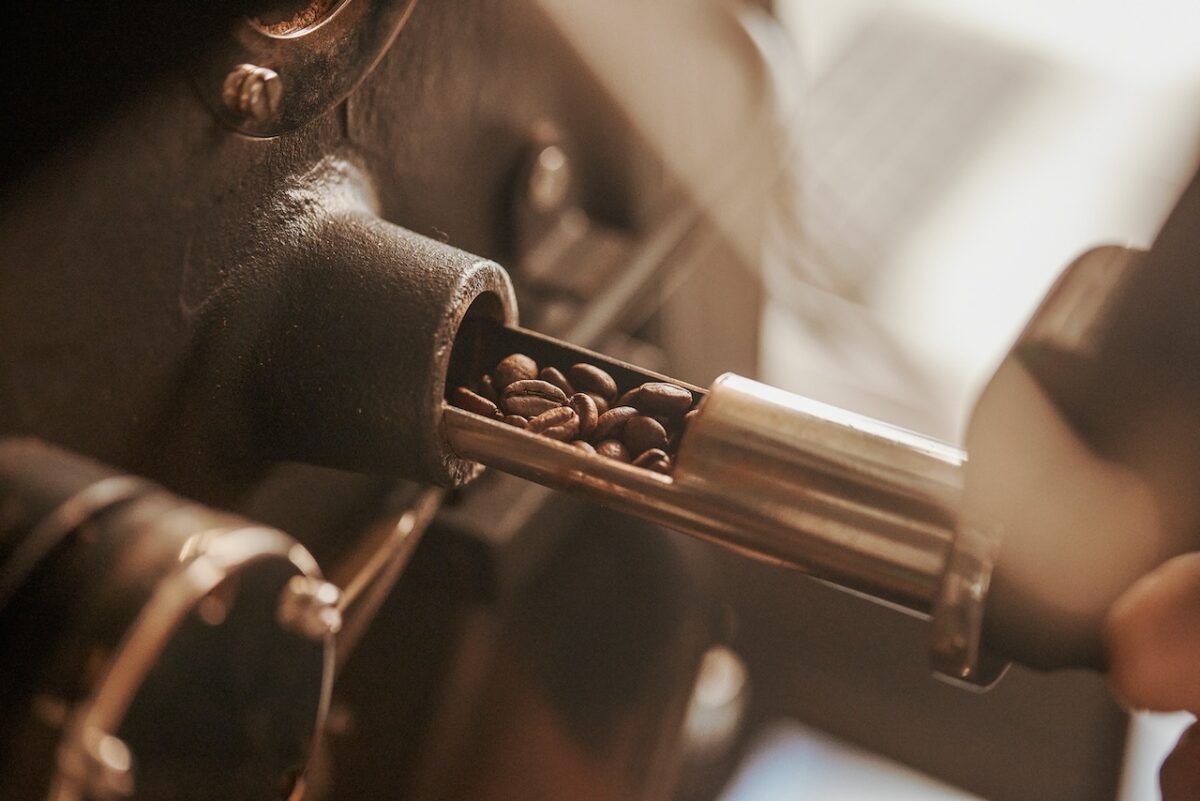
During his time with Starbucks, Suzuki worked at Neighborhood and Coffee, an offshoot brand focused more on brewing than at the company’s conventional stores. This experience also fueled his interest in roasting.
“Normal Starbucks cafes use automated brewing machines, whereas Neighborhood and Coffee uses a manually operated machine to brew and serve higher-quality coffee. So I had to think with my head to make a delicious cup of coffee. Being in such an environment brought me many discoveries and questions. I realized that learning about green coffee, or raw materials, was essential in serving good coffee, in addition to trying to improve its taste. That’s when it hit me that coffee was such a profound pursuit.”
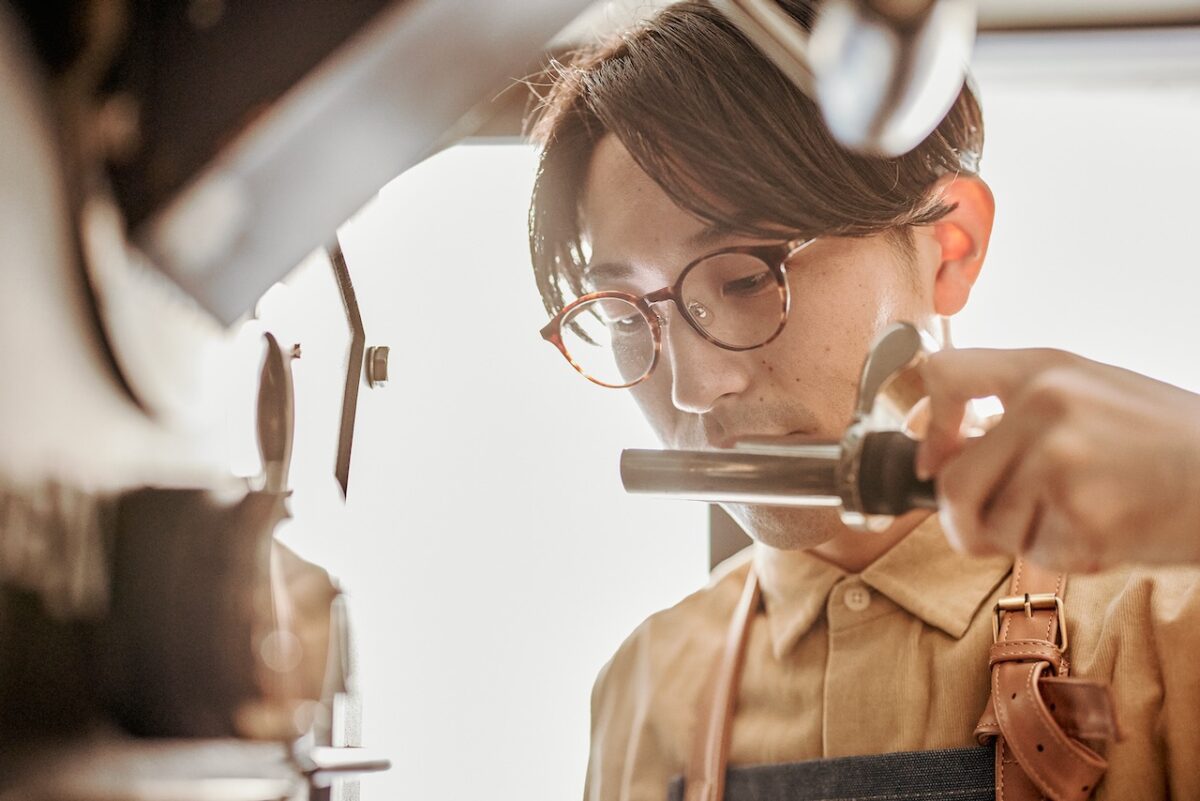
Suzuki went on to quit Starbucks, determined to start his career afresh as a roaster. He joined his current workplace to learn from a roaster he looked up to. But little did he know that the roaster was just one month away from leaving the company. And Suzuki, left to fend for himself, took over the company’s roasting.
“I didn’t imagine I would assume such an important role that early. Still, I took it with a positive mindset because I’d always wanted to roast.
Of course I braced myself for difficult challenges ahead, but I knew those would be necessary steps. So I tried and enjoyed them. Roasters are often seen as craftsmen. But I prefer the carefree style of roasters overseas who go about their work, dressed in everyday clothes. I like their approach to coffee, too.”

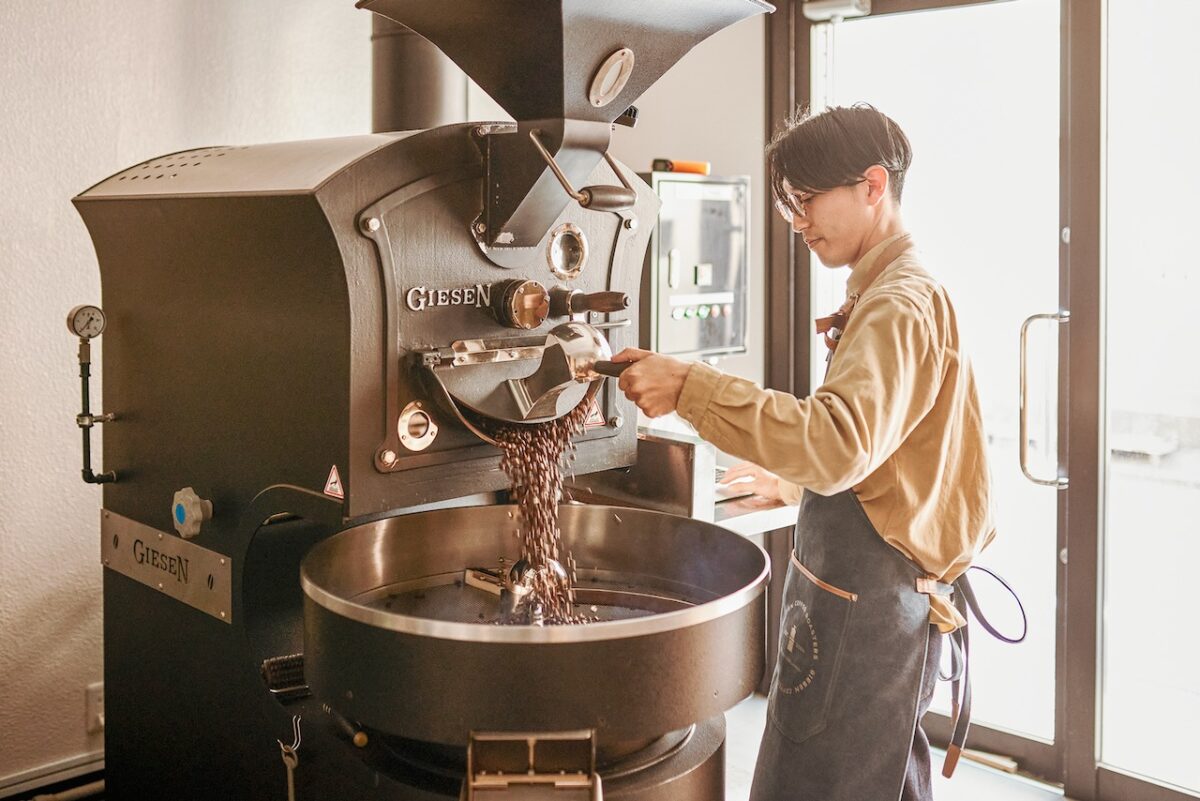
Revisiting unchosen approaches to explore coffee’s all possibilities
When roasting, Suzuki makes a point of not drawing a line between what’s right and what’s wrong – a mindset that allows him to explore all possibilities each coffee has.
“For instance, Ethiopian coffee is generally associated with its floral notes. But if I’m fixated on that image, I’m not able to think outside the box and try a different roasting approach. I can learn the most when the roast turns out the way I didn’t expect. Such experiences help me learn a lot and understand why different roasters have different opinions and styles. Those moments open my eyes to other approaches to roasting, too.”
If there is any style Suzuki attaches himself to, it is perhaps freestyle. Though he admires other roasters for expressing their own character in their roasts, Suzuki says his role is slightly different.
“I want to find possibilities in approaches ruled out by other roasters. I hope to introduce people to coffee’s diverse characters. I will be glad if my coffee moves the hearts of customers, or gives inspiration to other roasters. I want to make a positive impact on the industry and producers through my coffee.”
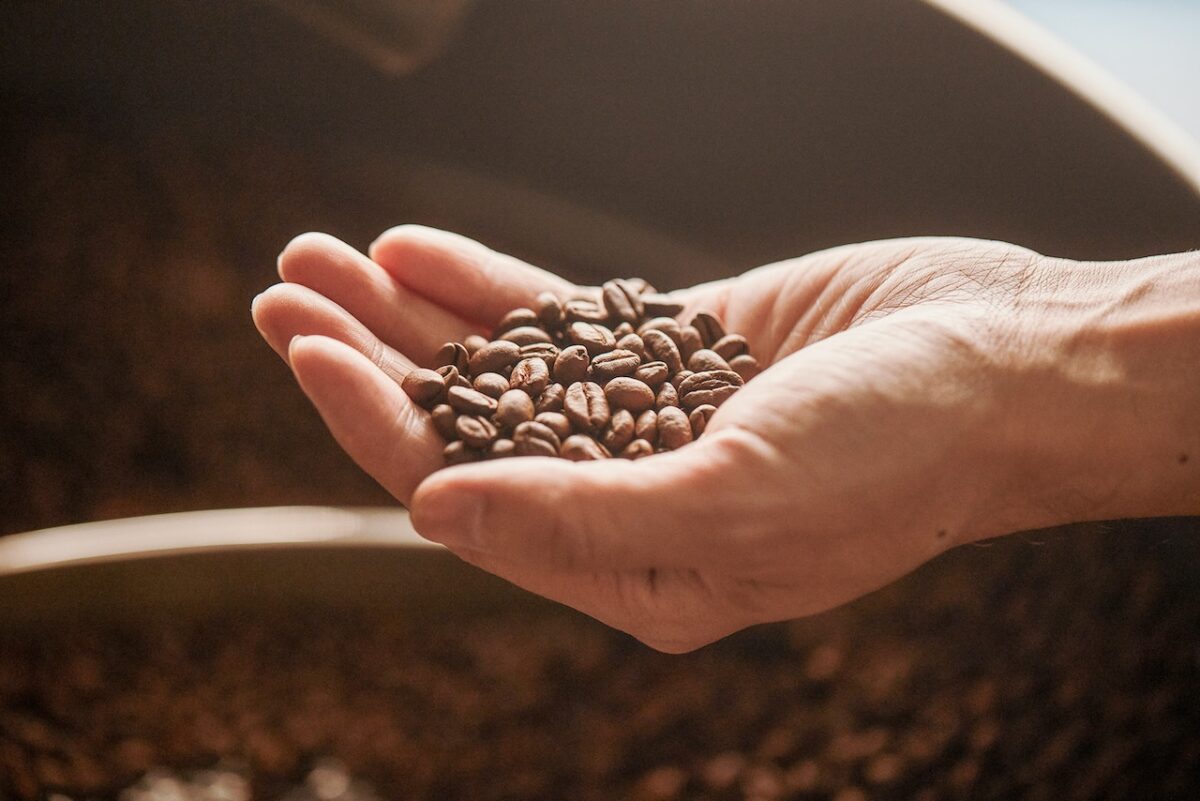
The difficulty of freestyle lies in having to choose one possibility from a vast sea of options and, one by one, see if each approach works. Suzuki invests his time and money in collecting information, above all. He especially turns to foreign sources, including books, social media posts, and blogs because he thinks they provide a more in-depth, organized trove of skills and knowledge than information available in Japan. When it comes to putting newly gained information into practice, Suzuki actively seeks opinions of peers around him.
“I’m never absolutely sure about whether my roast is good or not. So I try to enjoy the unknown. Having said that, I’ve grown somewhat more confident than before. But I’m careful not to put my own character front and center and create my own taste, because I think that’s boring. Sometimes conversation with people with different views opens new doors for me, and that helps me improve my craft. So I’d rather keep myself open to other people’s opinions than go it alone.”
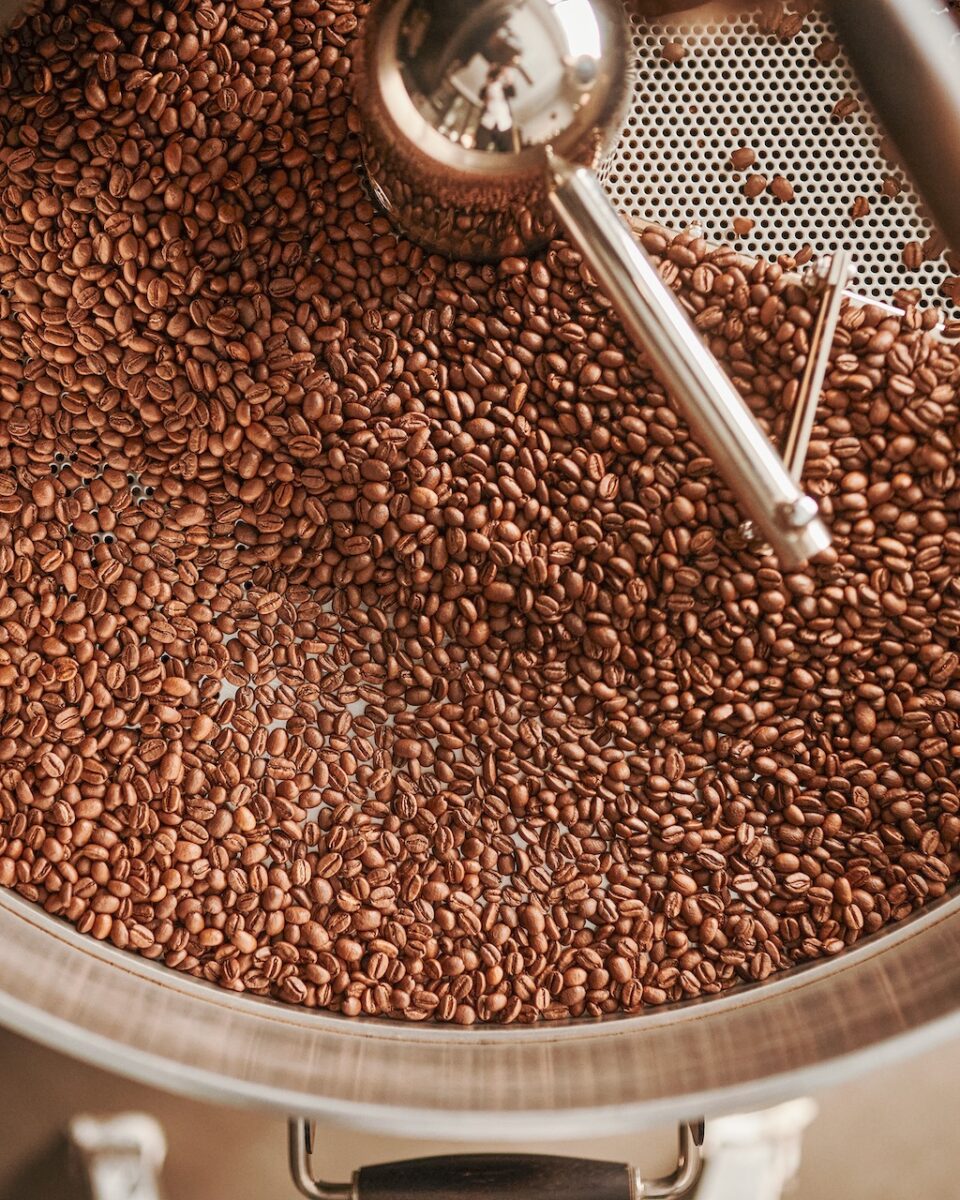
In fact, Suzuki often works with Ikeda when roasting coffee. Ikeda is now responsible for quality control, a position he took over from Suzuki. The two started splitting their roles around a year ago.
“Only after I started roasting did I realize the difficulty of choosing green coffee and the weight of responsibility that comes with judging raw materials’ quality. It was also challenging to figure out how to ensure quality and communicate my ideas to store staff. Communication with staff was particularly difficult because I didn’t work at the store with them. That’s why I tapped Ikeda to fill that void, since he is good at brewing.”
With Ikeda acting as an intermediary, it became easier for Suzuki to convey his intentions behind roasting to staff. And this in turn spawned a synergy of teamwork, allowing Suzuki to devote more time to roasting and take inspiration from Ikeda’s roasting.
“That was a positive learning lesson that I could only do so much by myself. Now, I get to spend my time more freely and am more open to new ideas.”

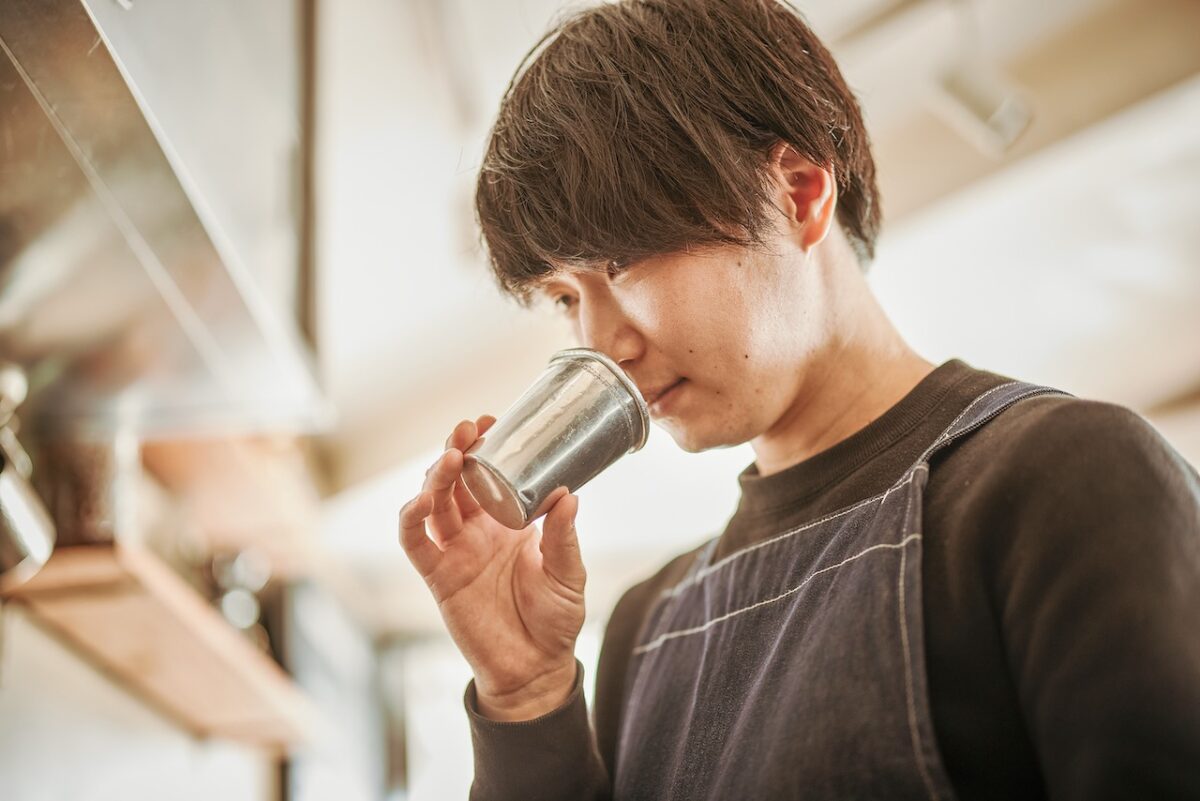
Circle of neighbors, widened by flexibility
Aside from quality control, Ikeda is also in charge of staff training. His role is to bridge a gap between roasting and store operations, always with the best interests of customers at heart.
“Coffee is only one of many options for our customers. Some of them are interested in coffee but not so into it because of acidity. I train our staff to find a recipe that brings out sweetness for such customers.
But at the same time, the quality of coffee changes drastically depending on how you express Suzuki’s roast in a cup. So I tell them to strike a right balance that brings out Suzuki’s character just to an appropriate degree but has everything coffee needs.”
Ikeda, who joined the company in 2018, took over staff training in 2020 after his predecessor left the job. Ikeda entered the coffee industry, yearning to work in a customer-facing position because he likes to communicate with people. Because of this backdrop, he now feels his current position fits his outgoing self.
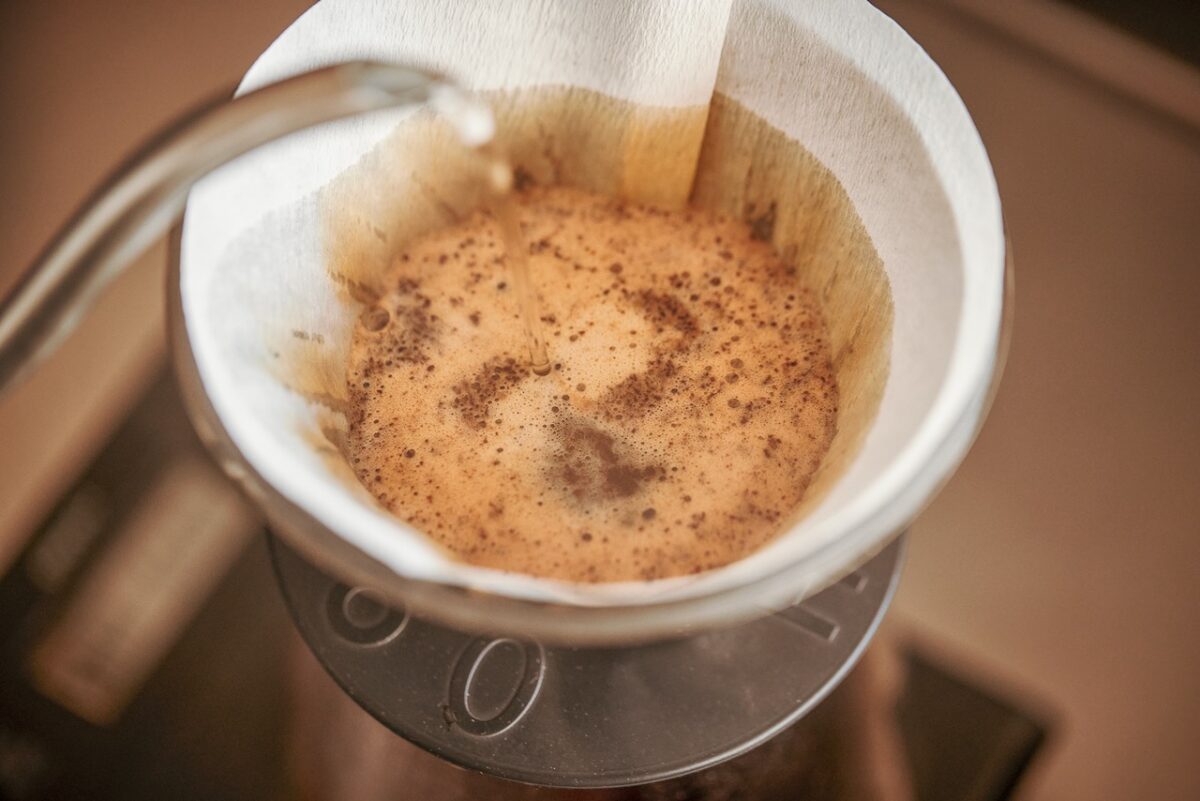
“I’ve always liked to think about how to pass on knowledge and skills. Each of our staff is different. So I’m always mindful of choosing the right words that are the easiest to understand for each member.
I teach them basic knowledge and the responsibility that comes with dealing with food. But I urge them to think about specific ways to communicate with customers. I could teach them all. But it seems wrong to have a single fixed idea or method and impose it on all members. Each of them has their own approach to coffee and working style. I think having people with diverse sensibilities is the key to keeping the store up and running.”
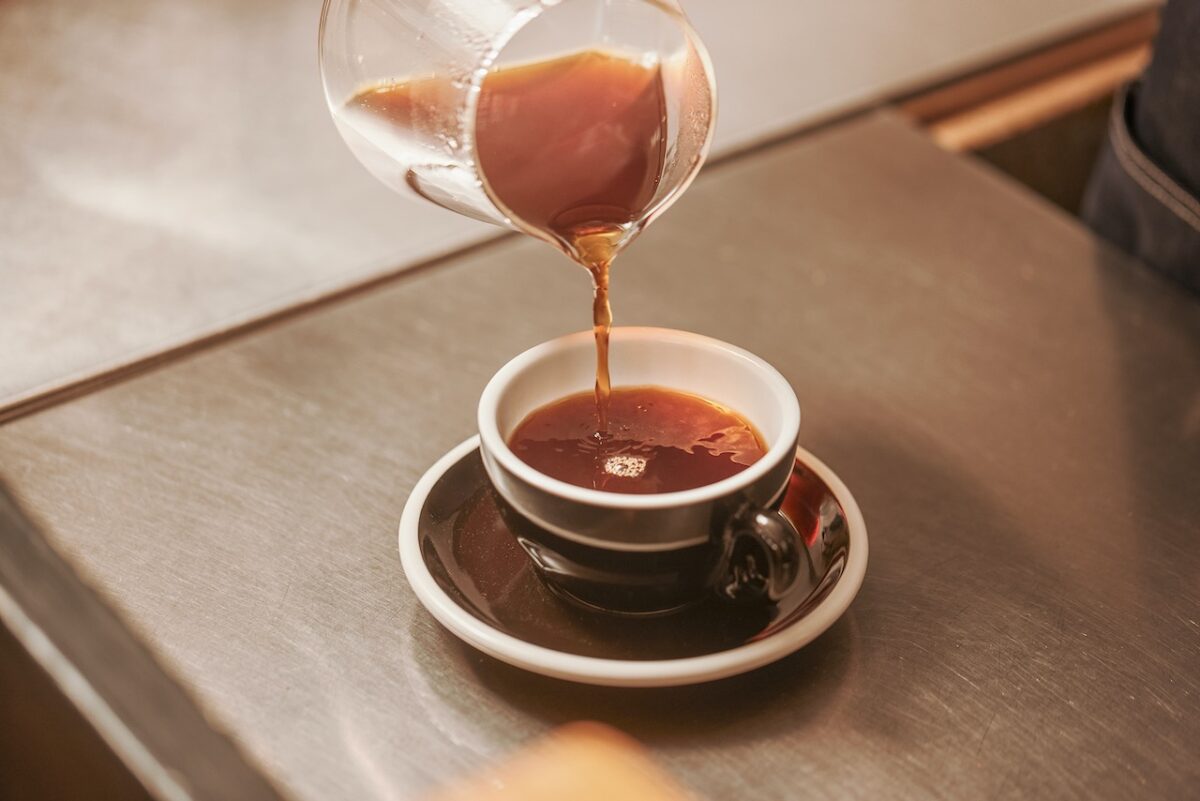
Ikeda’s such open-minded stance toward staff also spills over into his communication with customers. Some people come to buy just baked sweets or merchandise. Ikeda also tries to cater to the needs of customers who can’t drink coffee. And that approach sometimes leads to serendipitous encounters.
“Every now and then, such customers drink coffee here and realize its deliciousness. I try to find out what customers want and what I can suggest, keeping in mind that coffee isn’t everything.”
KIOSK serves specialty coffee. But he doesn’t necessarily stress that point to customers.
“We just happen to sell specialty coffee now. If there is good coffee that’s not specialty, we may start serving it, too.”
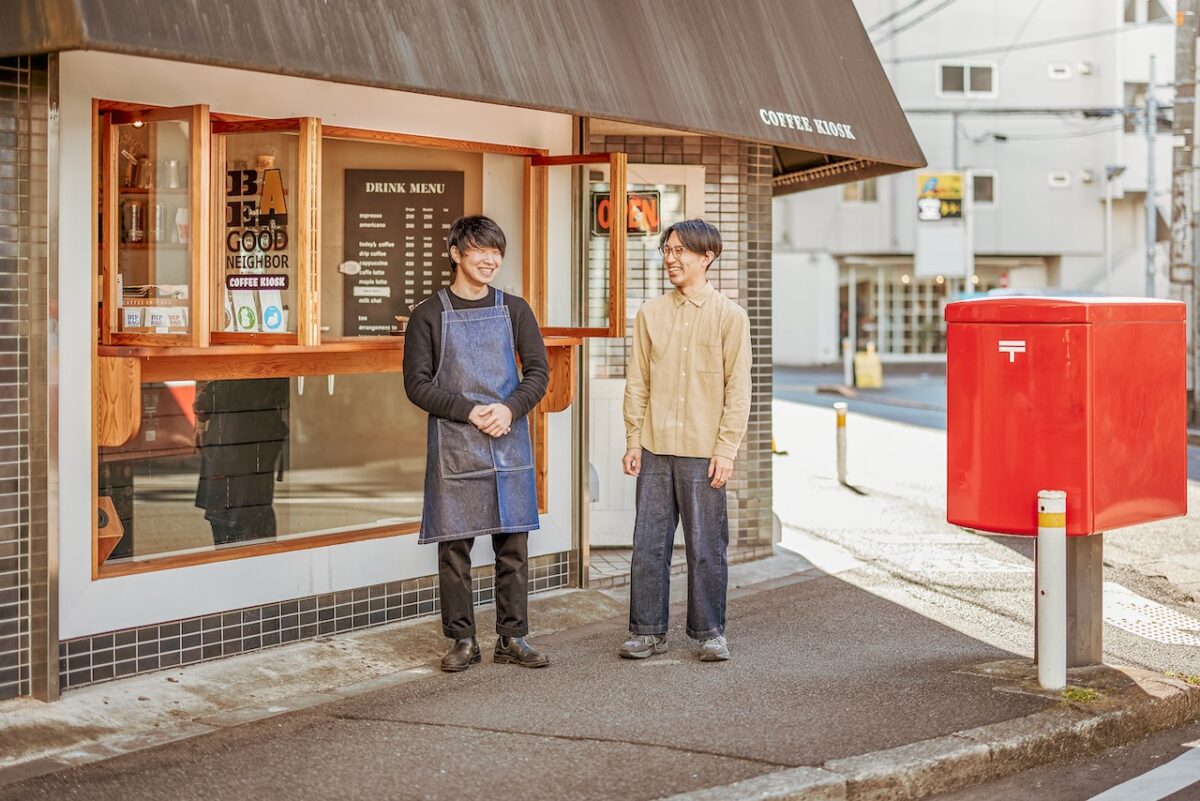
Flexibility and adaptability are the traits Ikeda and Suzuki share. They find a new possibility through conversation with customers at PROVISIONS and put it into practice, and receive feedback from different people. This cycle of open-mindedness exemplifies the store name “A GOOD NEIGHBOR.”
Suzuki says that his current goal is to further expand the circle of good neighbors.
“PROVISIONS and KIOSK are not that famous yet. I want more people to know about us, including that we roast coffee ourselves. I also aim to take part in roasting competitions and make good achievements.
Otherwise, I want to scale up our stores and have more interactions with producers. I became able to talk passionately about Costa Rica’s coffee after my visit to farms there. That experience taught me that knowing about a country’s culture is crucial in deepening understanding about its coffee. I hope to build connections with producers through more interactions and reshape my values in the process. And that can also lead to good practice for our company. Both Ikeda and I like Kenyan coffee. So I would like to visit Kenya first.”
Originally written by KANA ISHIYAMA
Edited by Tatsuya Nakamichi
Photos by Kenichi Aikawa
MY FAVORITE COFFEE人生を豊かにする「私の一杯」
Suzuki: Pretty much every coffee tastes good to me. But I particularly like a coffee that vividly conveys the views of the barista or roaster. When I see a barista brew coffee with a serious face, I wonder what is on his mind. And when I look at roasted coffee, I wonder what the roaster paid attention to.
Ikeda: My favorite coffee is one someone brews for me, wherever I am. I drink it with a sense of gratitude, imagining what was on that person’s mind. Doing that makes the coffee all the more delicious. A moment like that always makes me happy.

BE A GOOD NEIGHBOR COFFEE KIOSK
BE A GOOD NEIGHBOR COFFEE KIOSK
GOOD NEIGHBORS’ PROVISIONS
- [営業時間]
- Weekday: 8:30-18:00 / Sat: 11:30-17:00